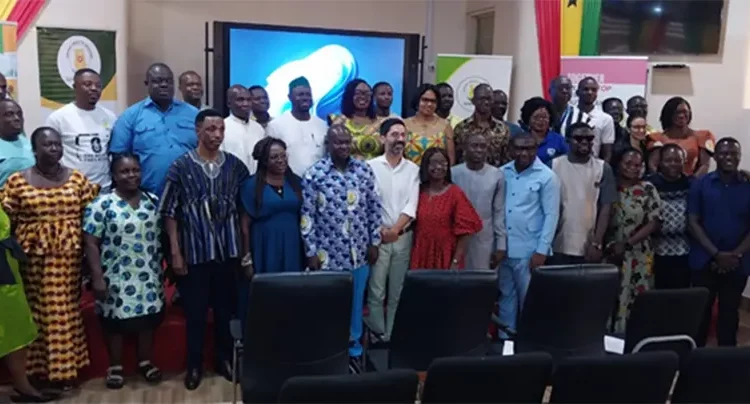Stakeholders in a group photograph after the meeting
The Ghana Health Service (GHS), in partnership with the Ghana Education Service, Ministry of Education, and UNICEF, convened a stakeholder meeting to develop strategies for the effective implementation of the Human Papillomavirus (HPV) vaccine in schools.
The meeting aimed to ensure a successful nationwide rollout, protecting young girls against cervical cancer, with the vaccination campaign scheduled to commence in September 2025.
The goal is to vaccinate approximately 2.5 million girls and protect them from cervical cancer.
Background
The HPV vaccine provides safe and effective protection against the human papillomavirus, a major cause of cervical cancer. Cervical cancer is a significant global health issue, with approximately 604,000 new cases and 341,800 deaths recorded annually. HPV infections are linked to 99% of cases.
Speaking at the meeting, the Director General of the Ghana Health Service, Dr. Samuel Kaba Akoriyea, in his speech shared that, the HPV vaccine is on the World Health Organisation’s (WHO) List of Essential Medicines and recommended HPV as part of routine vaccinations in all countries.
According to him, vaccines are the most effective means of preventing, controlling and protecting population from disease outbreaks.
Dr. Kaba Akoriyea emphasised that, it is estimated that HPV vaccines may prevent 70% of cervical cancer, 80% of anal cancer, 60% of vaginal cancer, 40% of vulvar cancer, and show more than 90% effectiveness in preventing HPV-positive oropharyngeal cancers. They additionally prevent genital warts, and also protect against penile cancer.
“The WHO’s priority purpose of HPV immunisation is the prevention of cervical cancer, which accounts for 82% of all HPV-related cancers and more than 95% of which are caused by HPV,” he said.
According to him, the large majority of cervical cancer cases in 2020 (88%) occurred in Low-Middle Income-Countries (LMICs), where they account for 17% of all cancers in women, compared with only 2% in high-income countries (HICs).
“In Ghana, we introduced the HPV vaccine in 2013, in the Greater Accra, Central and Northern regions. We gave room to follow up on any side effects and after 12 years of success, we are ready to roll it out nationwide to protect our future mothers. By vaccinating girls aged 9 to 14, we are giving them a head start toward a healthier, cancer-free adulthood,” he disclosed.
The Deputy Programmes Manager of Expanded Programme on Immunisation (EPI) of GHS, Dr. Naziru Tanko Mohammed, said Ghana is introducing the HPV vaccine into its routine immunisation programme to combat cervical cancer, a leading cause of cancer-related deaths among women.
Although new to HPV vaccination, Ghana has conducted pilot projects to inform the nationwide rollout. The Expanded Programme on Immunisation has been successful in introducing new vaccines, and the HPV vaccine is expected to be a crucial addition.
The Chief of Health and Nutrition, UNICEF Ghana, Dr. Juan Emmanuel Dewez reiterated that, according to available data, vaccination can reduce mortality rates to as low as 17 deaths per 1,000 girls vaccinated. When combined with screening and treatment for pre-cancerous and invasive cancer, the vaccine offers a potential pathway to elimination.
By Janet Odei Amponsah


